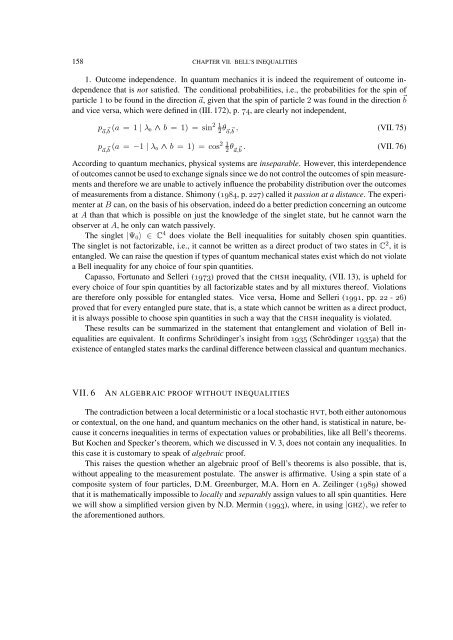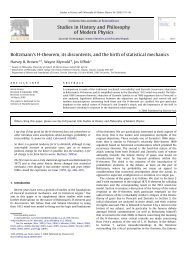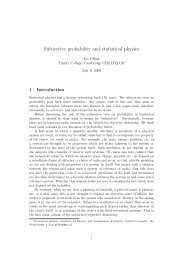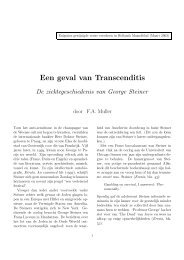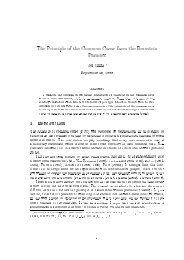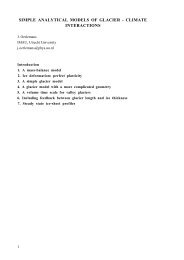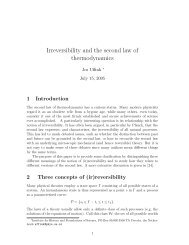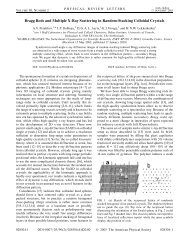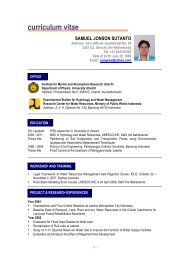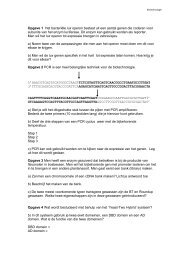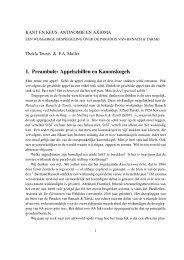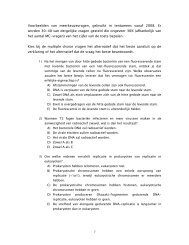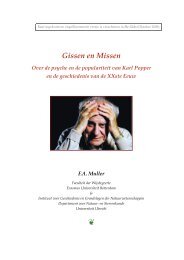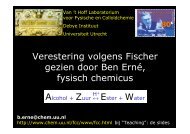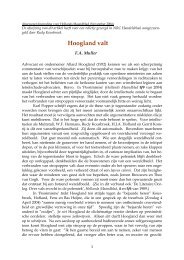FOUNDATIONS OF QUANTUM MECHANICS
FOUNDATIONS OF QUANTUM MECHANICS
FOUNDATIONS OF QUANTUM MECHANICS
Create successful ePaper yourself
Turn your PDF publications into a flip-book with our unique Google optimized e-Paper software.
158 CHAPTER VII. BELL’S INEQUALITIES<br />
1. Outcome independence. In quantum mechanics it is indeed the requirement of outcome independence<br />
that is not satisfied. The conditional probabilities, i.e., the probabilities for the spin of<br />
particle 1 to be found in the direction ⃗a, given that the spin of particle 2 was found in the direction ⃗ b<br />
and vice versa, which were defined in (III. 172), p. 74, are clearly not independent,<br />
p ⃗a, ⃗ b<br />
(a = 1 | λ 0 ∧ b = 1) = sin 2 1 2 θ ⃗a, ⃗ , (VII. 75)<br />
b<br />
p ⃗a, ⃗ b<br />
(a = −1 | λ 0 ∧ b = 1) = cos 2 1 2 θ ⃗a, ⃗ . (VII. 76)<br />
b<br />
According to quantum mechanics, physical systems are inseparable. However, this interdependence<br />
of outcomes cannot be used to exchange signals since we do not control the outcomes of spin measurements<br />
and therefore we are unable to actively influence the probability distribution over the outcomes<br />
of measurements from a distance. Shimony (1984, p. 227) called it passion at a distance. The experimenter<br />
at B can, on the basis of his observation, indeed do a better prediction concerning an outcome<br />
at A than that which is possible on just the knowledge of the singlet state, but he cannot warn the<br />
observer at A, he only can watch passively.<br />
The singlet |Ψ 0 ⟩ ∈ C 4 does violate the Bell inequalities for suitably chosen spin quantities.<br />
The singlet is not factorizable, i.e., it cannot be written as a direct product of two states in C 2 , it is<br />
entangled. We can raise the question if types of quantum mechanical states exist which do not violate<br />
a Bell inequality for any choice of four spin quantities.<br />
Capasso, Fortunato and Selleri (1973) proved that the CHSH inequality, (VII. 13), is upheld for<br />
every choice of four spin quantities by all factorizable states and by all mixtures thereof. Violations<br />
are therefore only possible for entangled states. Vice versa, Home and Selleri (1991, pp. 22 - 26)<br />
proved that for every entangled pure state, that is, a state which cannot be written as a direct product,<br />
it is always possible to choose spin quantities in such a way that the CHSH inequality is violated.<br />
These results can be summarized in the statement that entanglement and violation of Bell inequalities<br />
are equivalent. It confirms Schrödinger’s insight from 1935 (Schrödinger 1935a) that the<br />
existence of entangled states marks the cardinal difference between classical and quantum mechanics.<br />
VII. 6<br />
AN ALGEBRAIC PRO<strong>OF</strong> WITHOUT INEQUALITIES<br />
The contradiction between a local deterministic or a local stochastic HVT, both either autonomous<br />
or contextual, on the one hand, and quantum mechanics on the other hand, is statistical in nature, because<br />
it concerns inequalities in terms of expectation values or probabilities, like all Bell’s theorems.<br />
But Kochen and Specker’s theorem, which we discussed in V. 3, does not contain any inequalities. In<br />
this case it is customary to speak of algebraic proof.<br />
This raises the question whether an algebraic proof of Bell’s theorems is also possible, that is,<br />
without appealing to the measurement postulate. The answer is affirmative. Using a spin state of a<br />
composite system of four particles, D.M. Greenburger, M.A. Horn en A. Zeilinger (1989) showed<br />
that it is mathematically impossible to locally and separably assign values to all spin quantities. Here<br />
we will show a simplified version given by N.D. Mermin (1993), where, in using |GHZ⟩, we refer to<br />
the aforementioned authors.


